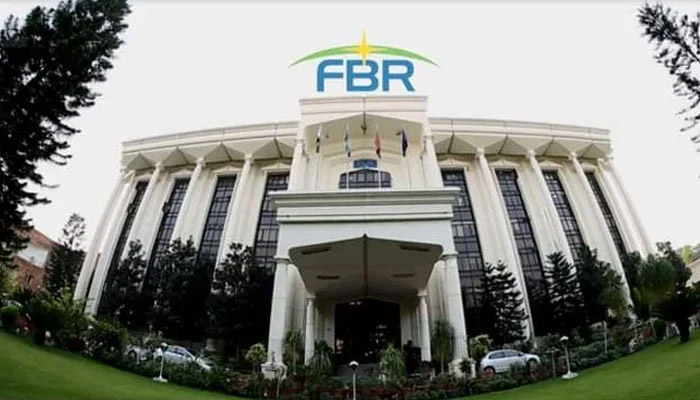Restructuring FBR: Will it resolve the issue?
FBR officials show reservations over latest proposals
January 15, 2024

ISLAMABAD: The caretaker federal government is all set to approve the restructuring of the Federal Board of Revenue (FBR), which it considers a revolutionary step, however, the officers of the organisation think that this decision may take the country into a financial crisis.
Officers concerned, while talking to The News on the condition of anonymity, said that top brass of the Special Investment Facilitation Council (SIFC), which approved the restructuring of FBR, has also been misled by vested-interest-driven proponents of these reforms.
These sources further revealed that SIFC leadership, in all sincerity, wanted to make the revenue collection mechanism more effective, but some discredited elements saw in it an opportunity to become relevant and use it for petty personal gains.
Since her appointment as caretaker finance minister, Dr Shamshad Akhtar, has been endeavoring to undertake an ambitious restructuring initiative for FBR.
However, the restructuring proposals have been unsteady and the pendulum of change has been swinging all around from one extreme to the other.
It started with the proposal to establish a unified tax agency for all federal and provincial taxes but the effort is to split existing FBR into multiple boards and entities with a sizable presence of private individuals overseeing such Boards.
The sources claim that this all lacks proper deliberation and due diligence. The presence of private individuals in oversight capacity also rings alarm as we recently had its bitter experience in the form of Shabbar Zaidi who was appointed as chairman of the FBR.
The initial proposals for restructuring included the establishment of the National Tax Agency at the federal level by merging all provincial and federal tax administrations besides the separation of the anti-smuggling function of Pakistan Customs from FBR.
Instead of adhering to the original proposal, the FM came up with a new proposal for the creation of a separate Policy Division under the Secretary Revenue Division.
Strangely, the separate Policy Division proposal was replaced with the establishment of four separate Boards for Customs, Inland Revenue, Policy, and Valuation, all being supervised by the Secretary Revenue Division. This plan was also shared with the powers that be around mid-December last year portraying it as a panacea for all ills afflicting the revenue collection machinery.
Subsequently, new proposals for restructuring were presented by the FM before the Apex Committee of SIFC on 03.01.2024. Astonishingly, these proposals were different from the already ones shared in mid-December. The new proposed restructuring plan includes the creation of separate Oversight Boards for Customs and IRS predominantly comprising Members from the private sector.
A serious conflict of interest is likely to emerge between private members of the Oversight Board and the State of Pakistan. One of the prime movers behind the creation of the Customs Oversight Board is Mukarram Jah Ansari who was previously serving as Member-Customs Operations but removed by last government due to his alleged complicity with and failure to tackle the smuggling networks operating in Karachi where FIA had even lodged FIRs against the Customs authorities on charges of corruption.
Ansari has prepared a list (Annex-B) of proposed private members which includes the names of Hussain Islam (Political Advisor to the incumbent PM), Saira Awan Malik (President TCS) and Manzoor Ahmed (retired Pakistan Customs Officer).
Hussain Islam and Dr Manzoor Ahmed, are also part of the Task Force constituted by the FM on FBR Reforms. This clearly establishes complicity not only at the design stage of said reforms but will also come into play at the implementation stage.
Sources reveal that the caretaker FM is pursuing her FBR Reforms Agenda in undue haste.
Besides aforementioned Mukkarram Jah Ansari, Ahmed Mujtaba Memon (former Secretary Privatization Commission and a Canadian national with known financial integrity issues), Shakeel Shah (Additional Secretary, PM Office) and SA to FM Zulfiqar Younus (a dual national and officer of Pakistan Customs having financial integrity issues) are other players behind the FM’s FBR Reforms Agenda for their own motivated interests.
Genuine concerns of tax administrations regarding possible loss to national revenue, compromising core state authority of taxation and promotion of conflict of interest vis-à-vis tax and fiscal policy by inclusion of private members are being disregarded.
Soon after presenting the reform proposals before SIFC, Prime Minister Anwar ul Haq Kakar directed to discuss the matter in the Inter-Ministerial Committee, comprising of the Secretaries of Commerce, Cabinet, Establishment, Law, Finance, and Revenue.
The committee during its meeting with the Finance Minister on 3rd January vehemently opposed the proposals on multiple grounds including non-viability, conflict of interest, and the required drastic changes in relevant laws.
When FM sought views on separation of Customs from FBR from the Pakistan Customs Service officers while appearing on a nationwide Video Link Conference (VLC), some senior officers asked what is the revenue enhancement plan in the proposed separation of Customs to which the Finance Minister and Mukarram had no answer and hastily concluded the conference.
Similarly, FM also met senior IRS leadership heading field set up across the country on 08.01.2024 at FBR Headquarters but failed to give any positive revenue impact of the proposed restructuring of FBR.
In contrast to the present ill-conceived and ever-changing reform plan, TARP was developed through a very comprehensive planning process and a scope that covered all key areas.
TARP planning involved a Task Force on Reforming the Tax Administration, followed by dedicated IMF mission and a project preparation grant by World Bank under which multiple studies were carried out. At planning stage, TARP took almost four years. After formal approval by ECNEC, the project implementation period spanned over six years (2005 to 2011). It was a comprehensive reform project that covered all three main planks (a) policy, (b) administrative and (c) organizational reforms. Consequently, all implementation initiatives were financed by the World Bank.
As such, the present structure of Tax Administration (FBR) is fully-reformed in recent history and is based on a broader consensus and ownership of all key stakeholders. 18th Amendment and Federal Fiscal Fragmentation Fiscal decentralization under 18th Amendment has resulted into fragmentation of the tax base to 54% of the GDP. Moreover, the 7th NFC award has further squeezed the already limited federal fiscal space by reducing it to 43% of the federal revenue.
This has placed state of Pakistan in a fiscal dilemma by seriously endangering its fiscal viability. Share of major sectors in the country’s GDP include Agriculture 23%; Services sector 58%; and Industrial sector 19%. The agriculture sector (contributing 23% of GDP) and Sales Tax on Services (also around 23%of GDP) makes 46% tax base outside the ambit of federal taxation regime. The above clearly indicates two striking but harsh realities for Pakistan; a totally fragmented tax base – resulting in poor tax collection and low tax to GDP ratio (9.9%) and extremely limited fiscal space (43% of the national revenues) for the federal government, endangering its fiscal sustainability.
Under the 18th constitutional amendment, wide-ranging fiscal powers have been devolved to provinces. However, provinces have been abysmally failed to mobilize their tax resources.
To date, provinces contribute only 0.8 percent to GDP in taxes, despite enjoying 46% of tax base. Resultantly, there was a realisation at federal level that while adhering to the existing constitutional framework, impact of such fiscal fragmentation may be mitigated by harmonizing all tax laws, maximum integration and putting in place a system of automated data sharing. The sources claim that following initiatives are under process to meet the said objectives:
a. Harmonization of sales tax - moving towards single sales tax return and common definition of goods and services across the country.
b. Data integration (Chairman NADRA currently leading this initiative)
c. Uniformity in valuation of real estate taxation
d. Harmonisation of all Inland Revenue Laws.
The national leadership has identified the above as priority action and objectives and has devised plans accordingly. It is also significant that the Development Partners (DPs) including the World Bank, Asian Development Bank and IMF have also included the above in their programs as Disbursement Linked Indicators (DLIs).
Recently, in December 2023, disbursement of more than US$ 900 million was made to GoP against these policy loans relating to Finance and FBR where above-mentioned Policy Actions were flagship initiatives.
The officers of the organisation claim that Pakistan, a significant part of Sales Tax and Income Tax is collected at import stage but it becomes part of the entire tax liability of the taxpayer when he files his tax return.
Making two agencies responsible for these taxes will create a multitude of issues of interpretation, valuation, and timely and complete data sharing, such that the taxation throughout the supply chain will be affected and tax evaders will be able to play one agency against another besides opening a flood gate of litigation.
The above concept can be elucidated through the fact that although recent import contraction led to sharp decrease in tax collection at import stage but FBR, being one agency responsible for meeting the assigned revenue targets, took measures to fill the gap through increased collection in domestic taxes.
More than Rs100 billion was covered by domestic taxes to meet the shortfall of Customs Duty. This could not have been a possibility if there had been two different agencies for import and domestic taxes. Global Trends in Taxation When there is a path dependence in national tax policies and the nation is hostage to the paths taken in the past, there is a clear pattern emerging internationally.
In this context, there is a strong need to harmonize and integrate the tax administrations. The sources claim that following are few examples of international best practices:
a. India in recent years, starting in 2017, implemented a landmark Sales
Tax reform after lengthy negotiations between Central Govt and all
States that replaced more than a dozen federal and state levies with one
Goods and Services Tax and unifying a $2 trillion economy.
b. Germany has promulgated a single German Fiscal Code (2002) that
contains the common rules and procedures which apply to all taxes.
c. In UK, in 2004, after lengthy deliberations spanning over two years, the
Inland Revenue and HM Customs & Excise were merged in to Her
Majesty’s Revenue and Customs (HMRC) eliminating centuries old structures.
d. In a new era of harmonisation of taxation at international level, the Organization for Economic Co-operation and Development (OECD) is leading an international initiative that would provide for uniform system for taxation of companies operating internationally.











